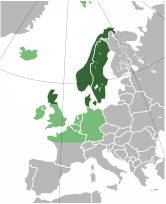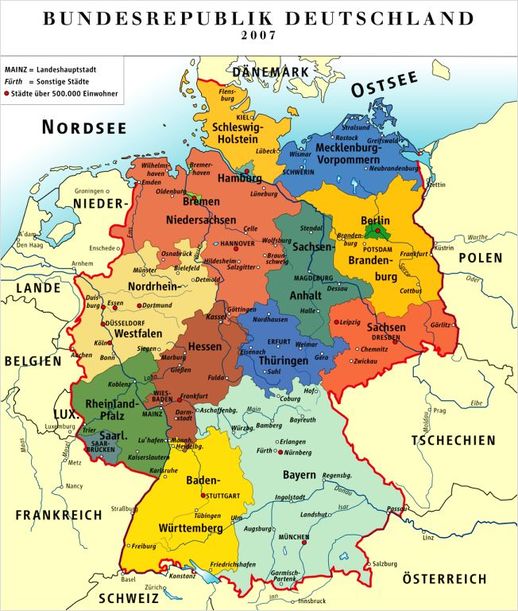|
Europeans tell me that I can pass for any of the nationalities of continental northwestern Europe. I started hearing this in 2007 when I started to meet real Europeans, and it continues. Some guess specific single countries; some say “it could be one of several;” in either case, it’s always northwestern Europe.
What’s remarkable is that they’re right. I am, in fact, of half Scandinavian, 3/8ths German, and 1/8th Colonial New England ancestry (the ultimate-country-origins of this last line I haven’t learned but odds are good, given who settled in Colonial New England, that it is entirely northwestern European, as well). (See Also: post-223: “Kinsfolk By the Millions“). |
|
Germany has probably been the most-often-made guess. To guess “Germany” in this kind of guessing game is to stay close to the trunk and not venture out too far on any limb, since Germany is, in many ways, a meshing together of several smaller, more-organic “nations” united by a language. Accordingly, a wide range of European “looks” are at home in Germany. (Chancellor Conrad Adenauer had a very exotic look. I wonder how he’d have fared in this guessing game. I wouldn’t guess Germany.)
The most specific was from a German young man who narrowed it down to a state (Bundesland) of Germany. This German’s name and face I’ve long forgotten, but I can still hear his answer in my mind. He said I’d best fit in Niedersachsen [Lower Saxony]. Wait. Now that I think of it, it may have been Mecklenburg-Vorpommern. It was one of those. I’m sure it was on the water (see below) and I’m sure it wasn’t Schleswig-Holstein (a German state that some of my Danish ancestors found themselves in, against their will, after Denmark bungled a war in the 1800s and lost territory). It’s easy to make fun of this kind of thing. “How can you narrow down someone’s ‘look’ to a specific state in the Federal Republic of Germany? That’s crazy.” I remember thinking, though, You know what? The geographic centroid of my ancestors’ places of origin probably *is* around about that state. There was no way he could’ve known any such a thing, about me, someone he’d just met that very day, and before I told him anything. He guessed it from sight alone. Impressive, I say. Impressive. On the below map, his guess was either the top red state (Niedersachsen) or the top blue state (Mecklenburg-Vorpommern). The more I think, the more I lean towards Niedersachsen. Yes, I’m 90% sure it was Niedersachsen. |
There is also this. I hardly recall any case at all in Germany of someone in public speaking to me in English straight away. Always German. This was not the case for other White Americans I knew. I recall one American friend, B.A. We attended the same university in the USA, even, but met in Germany. He was what in physical anthropology is called the Atlantid type (that black-haired British Isles type). That sort of face is rare in Germany, the sign of a likely foreigner, probably an English-speaking one. I recall that when Germans saw B.A., they tended to use English. Not always, but sometimes. Then there was the case of the girl who spoke to me in German and asked whether I was showing B.A. around Germany! She said something like “It’s lucky he has you to show him around.” She thought I was a native German. (I think I have related this story on these pages before.) In fact, we were both foreigners and had similar levels of German; mine was better, but not by that much. (There was also the case of I.S., a Polish friend, whose German was much better than mine. In her time there in the 2000s, she said Germans would ask her “Sind Sie aus dem Osten?” or “Are you from the East?”).
Germans are very nice and will very often address someone whom they believe to be a native English speaker in English, even in Germany. In many other countries, language of address in public can be a more delicate matter with “political” implications. Estonia was such a country. Kazakhstan was. Malaysia is. In a very different way, Korea is, too.





[Originally published Dec. 31, 2015] [reposted after comment loss]
Peter,
Still enjoying your posts. Your grandfather’s ancestry originates from the Schleswig-Holstein area. Your great grandfather spoke of it often.